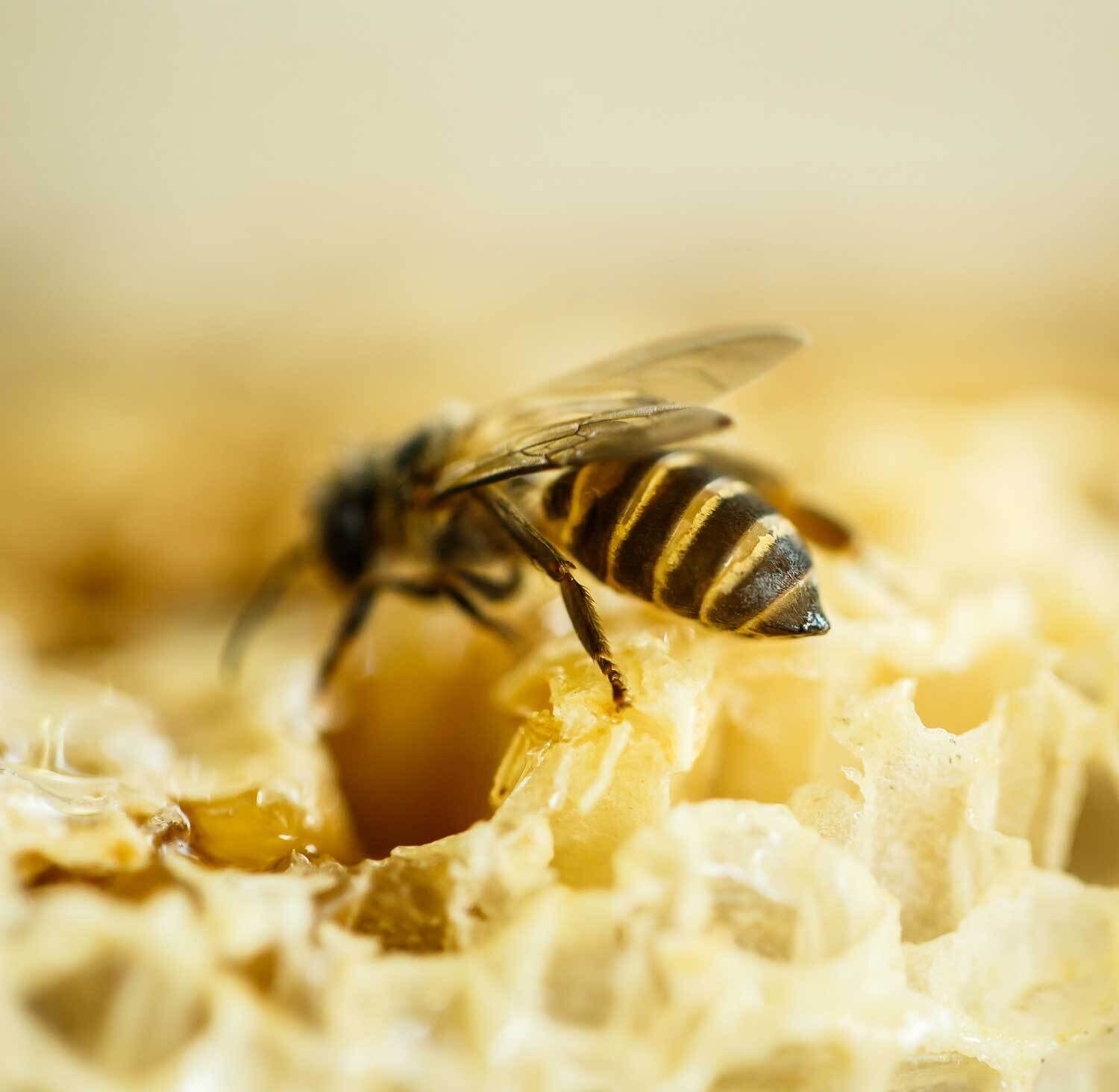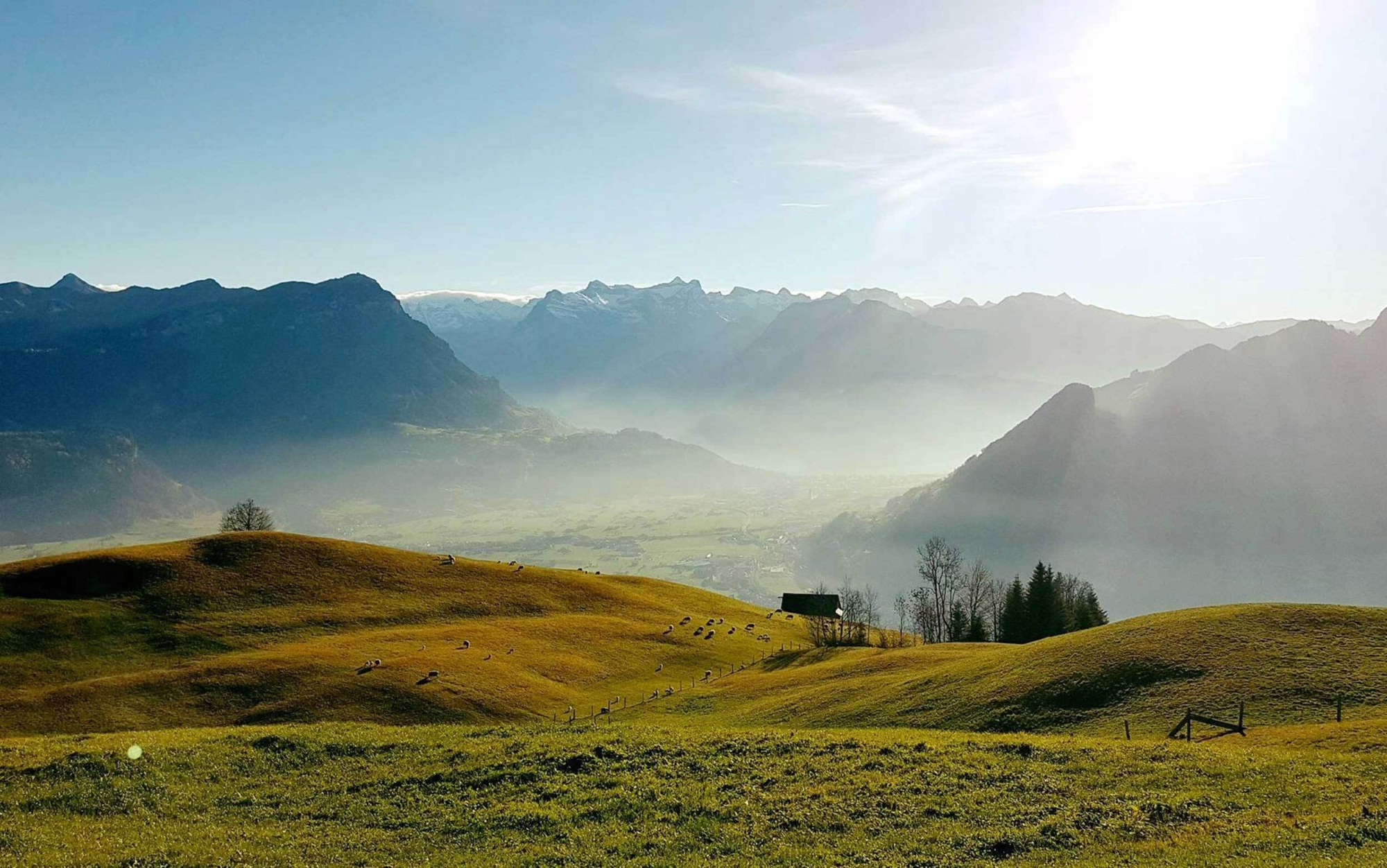
Sustainability is not just a buzz word for us on the Blüemlisberg mountain, it is in fact an integral part of our philosophy.
We strive for sustainability and constant improvement in every aspect of everything we do, from initial production through to the end customer. It goes without saying that we operate our business in accordance with ESG (environmental, social, and governance) criteria.
Our commitment to sustainability
More than 50% of the area of the Blüemlisberg mountain is categorised as good for the promotion of biodiversity. These areas meet the stringent biodiversity requirements for promoting species diversity. All pastures are carefully mowed using motorised mowers. This is much less efficient and much more labour-intensive than using a top-of-the-line mechanised mowing unit. However, this manual method protects the fawns, hares and bees (see box below) that live in our pastures, as they have time to run away, be seen and not get injured by the mower.
Our Galloway cows live alongside the Blüemlisberg goats and are an undemanding and extensive breed. They look after the landscape and eat things such as the hay that the goats leave behind, thus contributing to the efficient use of hay without any waste. Food left over by the cows is used as fertiliser and seed for our pastures.
By optimising our pasture management we promote the growth of local vegetation while also reducing the pressure from parasites. The right balance of local vegetation ensures that even the hottest summers yield a good amount of feed for the winter. This also reduces the need to take phytosanitary measures (problem plants). The development cycles of parasites are therefore also reduced, meaning that our animals require less or no veterinary care. Our aim is to promote the growth of local flora by having many herb-filled meadows as the ideal basis for feeding our animals.
We care about looking after nature, the landscape and soil conservation. Our barn, which was built in 2017, fits in perfectly with our unique landscape and topography. The flat rounded roofing tiles are aesthetically pleasing and emphasise its character. The barn has been built with two floors as it is not just the goats who enjoy climbing all over the place. The special two-floor barn has been designed to minimise the amount of sealed ground. This concept means we have achieved a more than 40% reduction in the amount of valuable land lost to construction compared to a traditional single-storey barn design. We see this as yet another contribution to sustainability on the Blüemlisberg mountain.
Here on the Blüemlisberg mountain, we try to keep our use of external resources as low as possible and make use of local resources to remain as environmentally friendly as possible. Our own spring water forms a vital part of our subsistence, for humans and animals alike. We even use this local resource in the production process, e.g. for cooling the goat’s milk immediately after pasteurisation.
Without the use of artificial fertilisers, hay and aftergrass yields are lower. We intentionally avoid the use of artificial fertilisers, and thus the higher feed yields, in order to promote stable growth of local vegetation in our pastures. We use only our own fertiliser on our pastures in the form of manure and slurry. Our relatively ‘acidic’ soils are also treated with lime every four to five years in order to support natural humus formation and mineralisation as well as to keep the land fertile.
We do not use any pesticides. If absolutely necessary, we use individual treatments on problem plants. Our own spring water is one of our most important resources to protect. As the source of the Gründelisbach and Lauitobelbach streams that flow into the Lake Lauerz and on into Lake Lucerne, we are conscious of our responsibility to ensure the supply of drinking water stays clean and the ecosystem protected.
Happy animals in the barn and in the field enjoy better health. The barn is a key element for ensuring the health of our animals, offering plenty of variety and space. From spring to autumn the animals spend most of their time in the pastures, weather permitting. If these preventative measures are not sufficient, then our animals receive homeopathic treatment. If there is simply no other way, then our animals are seen by a traditional veterinary surgeon. However, we try to keep this to a minimum. Antibiotics are a last resort.
Our goats and Galloway cows are given concentrated feed to encourage them to eat and to ensure optimum nutrition according to the needs of the animals. This concentrated feed is kept to an absolute minimum. Towards the end of the pregnancy period, just before the birth of the new kid, the animals have higher energy requirements. It is at this time that our goats receive additional special feed such as natural fish oil. To ensure an optimum supply of minerals throughout the year, our goats are fed minerals enriched with selenium or biotin ad libitum. The primary feed basis is, and remains, the roughage from our own farm.
The use of liquid fossil fuels (petrol/diesel) is unfortunately still unavoidable in the agricultural sector. However, there are some things we can do when it comes to electricity. We currently have a project to be as independent from mains electricity as possible using photovoltaic panels and battery storage. Our freezers and pasteurisation machinery for producing ice cream are particularly heavy electricity consumers. We are working to reduce our dependence on external power supplies bit by bit.
Avoiding the use of energy from fossil fuels and increasing energy efficiency is of high importance to us. Around one third of our milk is used to make fine ice cream on-site without any product having to be transported anywhere. A further third is transported to the Käserei Odermatt cheese dairy in Dallenwil/NW, where all our speciality cheeses such as the mutschli goat’s cheese, apéromöckli hard cheese or formaggini in rapeseed oil are produced. The final third of our goat’s milk is dried to produce long-lasting milk powder for packaging in tins as well as for manufacturing cosmetics and chocolate. This process is indeed energy-intensive and necessarily generates emissions from transportation. Food safety processes, e.g. the cold chain or hygiene measures taken by specialist businesses, are energy-intensive. Fortunately, we have been able to find all our partners in Switzerland, allowing us to produce all of our final products (with the exception of cosmetics) within a 50 km radius.
As an artisanal business, we control every step of the product cycle ourselves – from feeding the animals, to the additives in our products, through to packaging and sales – and always guarantee the high quality and safety of our food. Materials that are harmful to the environment, such as microplastic, hormone-active substances, etc., are not part of our business. We try to avoid the use of use of plastic in our packaging, focusing instead on sustainable materials. This is an ongoing process that we are constantly working on.
In order to get our delicious delicacies to you, our customers, we require points of sale, which we try to supply with products in the most energy-efficient way possible. Our refrigerated van consumes minimal energy despite its cooling performance (–18 °C). The most sustainable and relaxing way to enjoy our products is here in the farm shop on the Blüemlisberg – we look forward to seeing you and letting you partake in our delicacies!

Bees – the world’s most important creatures
During a meeting of the Royal Geographical Society, bees were officially named the most important living creatures on the planet (The Science Times). Seventy per cent of the world’s agriculture is dependent on pollination by bees. Without them, plants and flowers could not easily reproduce. And without new plants and flowers, there would be even less food for us and our animals. The importance of bees for ecosystems cannot be ignored or understated. Without the symbiotic pollination cycle, the reproduction and growth of natural resources would come to a stop.
 Products made using the finest goat's milk from the heart of Switzerland
Products made using the finest goat's milk from the heart of Switzerland

© Copyright 2026 by Blüemlisberg AG | Design & Concept by UBIQ AG






